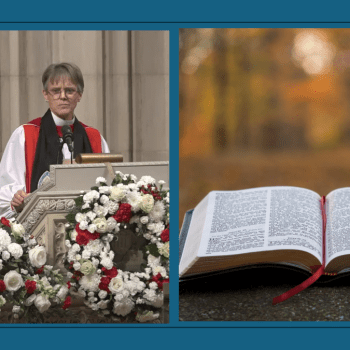The good news is that the Lord has come and will come again. Our joy is that his coming means the healing of the sick and the raising of the dead: cripples walking, the blind seeing, the deaf hearing, diseases cured. It also means that devils will be cast out.
To take part in the Lord's coming is to take part in the healing of the sick and the raising of the dead. Over and over again the Book of Mormon warns against those who do not care for the poor, who cast people out of their synagogues for their clothing or class. It reminds Mormons that the true covenant people are healers and raisers rather than excluders and oppressors. We claim to inherit the covenant given to Abraham (D&C 132:29-31), but we do not keep covenant if we fail to take part in the coming of Christ to those in need.
Ironically, however, if I worry too much about whether I am oppressed or an oppressor, then (because I cannot trust my own judgment in such things), I am likely only to make things worse. My certainty about my situation cannot be trusted, so I cannot with any assurance rid myself of my status, whether that of oppressed or of oppressor. It must be taken from me. My demon must be cast out by someone I can trust.
The coming of the Lord makes that possible by making life in Christ possible. In spite of that possibility, for too many of us such life doesn't happen or it happens and then ceases to happen. The advent of the Lord has neither beginning nor end, so for those to whom it happens, it must continue to happen. Jesus must continue to come to us, bringing us to our knees in repentance, awe, and joy at our salvation from ourselves, bringing us to join him in healing the sick and raising the dead, joining him in rejoicing in his faithfulness to his covenant.
Luke 1:26-38: And in the sixth month the angel Gabriel was sent from God unto a city of Galilee, named Nazareth, to a virgin espoused to a man whose name was Joseph, of the house of David; and the virgin's name was Mary. And the angel came in unto her, and said, Hail, thou that art highly favoured, the Lord is with thee: blessed art thou among women. And when she saw him, she was troubled at his saying, and cast in her mind what manner of salutation this should be. And the angel said unto her, Fear not, Mary: for thou hast found favour with God. And, behold, thou shalt conceive in thy womb, and bring forth a son, and shalt call his name Jesus. He shall be great, and shall be called the Son of the Highest: and the Lord God shall give unto him the throne of his father David: and he shall reign over the house of Jacob for ever; and of his kingdom there shall be no end. Then said Mary unto the angel, How shall this be, seeing I know not a man? And the angel answered and said unto her, The Holy Ghost shall come upon thee, and the power of the Highest shall overshadow thee: therefore also that holy thing which shall be born of thee shall be called the Son of God. . . . With God nothing shall be impossible. And Mary said, Behold the handmaid of the Lord; be it unto me according to thy word.
Mary's blessing is also ours: we too are highly favored, blessed by God. Presented with that message, we too must avoid fear, the fear of receiving God's blessing, the fear of losing control of our lives by being taken control of by him, the fear of being overcome by the Spirit and overshadowed by the power of God.
It may seem impossible that oppression will end, but the first step toward that end is recognizing that whatever our own limitations "with God nothing shall be impossible." We too must say "Be it unto me according to thy word." Then we must learn what that word is and allow it to fill our lives.
Filled with the word of God that we are given by the Word, we look forward to the day of the coming of the Lord with joy that anticipates joy. When that happens even today's afflictions can be occasions for glory (Rom. 5:3) and temptations can bring joy (Jas. 1:2). Not pie-in-the-sky joy, but a joy that infuses life without removing its materiality and particularity. Indeed, not pie-in-the-sky joy, but one that infuses life with materiality and particularity: the materiality into which we have been born, the particularity that we are, a materiality and particularity made new by his coming.
Joy comes to us where we are rather than someplace else. Jesus comes to where we are rather than to some imagined place. He brings joy in this world, now. And he brings it by renewing the world in which we live.
Joy to the world, the Lord is come! Let earth receive her King. Let every heart prepare him room.





